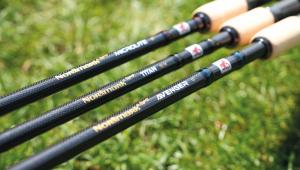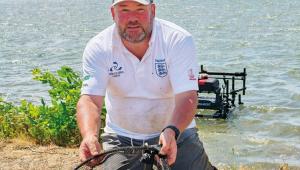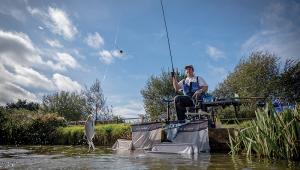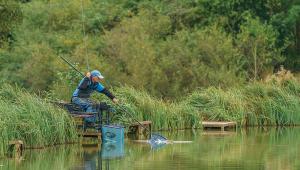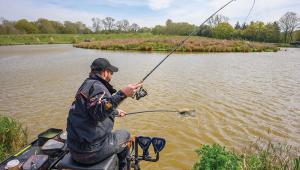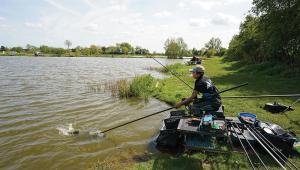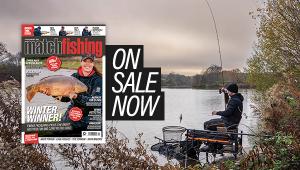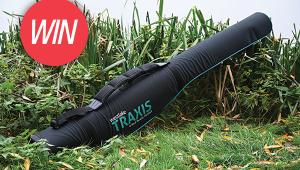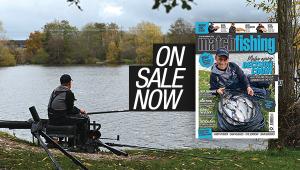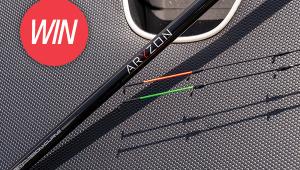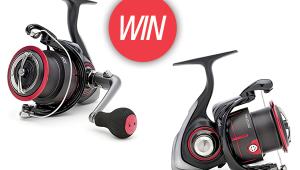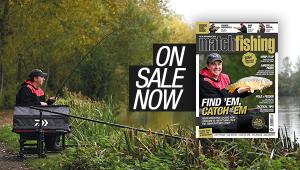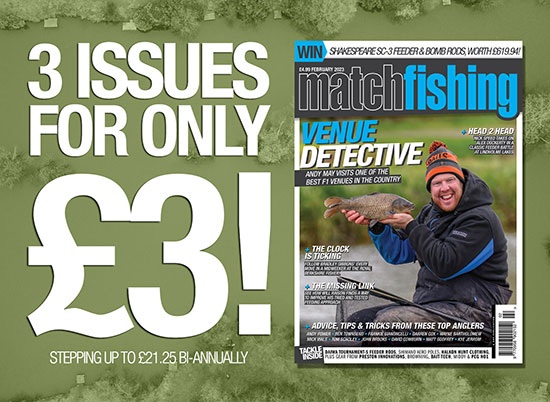The Prince Of The River
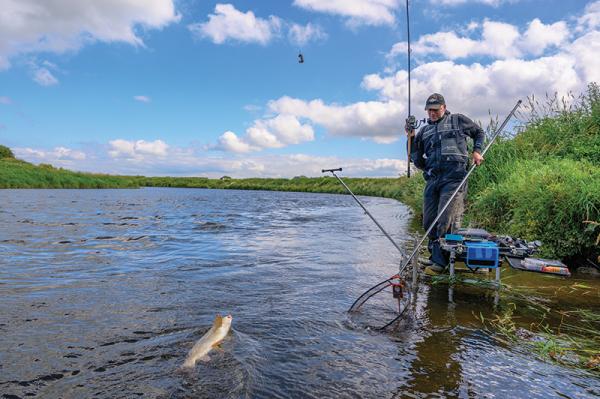
I think everyone who’s been fortunate enough to have been graced by one of these beautiful fish can relate to the fact that the barbel is the most majestic fish on the river ‘bucket list’. I remember in my early twenties making it my mission at least once in each season to make a trip with Gregg Owen and Kevin Vickers down to the River Severn at Bridgenorth for a barbel bonanza.
At that time this particular area was the Mecca for barbel fishing and in all honesty I don’t think anything can compare to the experience of catching a barbel, from the anticipation of a bite to the rod nearly being dragged in, to an unbelievable fight and then to be graced by what I believe is the holy grail of river fish.
As with all venues I always find it interesting how evolution has reshaped certain waters, and now barbel are in abundance a lot closer to home now on the mighty River Trent. Plenty of matches are now being won with them and they can be caught from a lot of pegs as they have spread along the river. In a way there’s a stigma attached with barbel that you need specific tackle to target these unique fish, but like with all disciplines and approaches, from a match angling point of view it’s all about getting the balance right.
In abundance or not, these are without doubt the most elusive fish to tame, as especially as they get older they’re so susceptible to light, and as a result trying to target them in match conditions makes them even more challenging. That to me is why I love this style of fishing.
Although I haven’t reached that crossover point yet of getting ‘bivvied up and night fishing for barbel, I still find it extremely challenging to try and target this species during normal daylight hours and of course that’s exactly what we need to do as match anglers.
To show my thought process behind how I target these beautiful fish on a match style approach, I met up with Dave Wesson on the tidal Trent. Now in my belief ‘location’ for this feature is the lesser part of the story, as without doubt it’s the actual approach that makes a huge difference to whether or not you manage to trigger these fish into feeding during the day, because more often than not they’re reluctant to feed until the light drops, unless there’s colour in the river. As with all fishing, staying in tune with nature is paramount, you need to feel part of it, and especially with river barbel keeping up to date with the weather and river levels is crucial if you’re going to reap the rewards.
The day we chose was a perfect day as it was an overcast with a recent downpour of rain, which has helped maintain a tinge of colour in the water.
Now, I’m no expert at barbel fishing, but one thing I’m quick at figuring out is specific approaches that make a big difference when targeting certain species. Without doubt one thing I’ve found is that although up and down the Trent the barbel are getting targeted with a specimen bait approach such as boilies and pellets, there is no substitute for natural, more relative match baits such as hempseed and casters.
Regardless of the size of these fish, this particular bait combination is irresistible to these fish. It’s my belief that this combination really does help trigger these wary fish into not only investigating the bait, but actually feeding when maybe other baits might not have the same appeal and effect.
From a match angler’s perspective, it’s always the bait choice that’s at the forefront of your decision making and is the difference between an approach working or not, and during my ventures when barbel fishing it’s been apparent to see that natural ‘match baits’ really do make a huge difference when other baits produce less of a response.
Of course, these fish are packed with power so the setup for barbel is very specific, from the rod choice right down to the choice of hook. Being specific with the setup enables you to also be selective for certain species such as barbel, which in turn deters other nuisance fish from upsetting your trap.
My rod choice is the 13ft Aero X7 Distance Power Feeder 120g, which is the perfect tool for the job as it’s got loads of power for the casting of heavy feeders to cope with the river pace, to playing and staying in control of these powerful fish throughout the hard and often tiring fight. Again, the reel is equally important as you need a real powerhouse model that can cope with the rigours of retrieving feeders through powerful water, especially with a big powerful barbel attached at the other end. For this reason there is only one choice in my opinion, the Shimano Ultegra 5500XTC. Main line choice is 0.28mm, which is extremely abrasive and perfect for dealing with the terrain you’re faced with in this style of fishing, as you need a line that will not let you down, especially when the fish are running for freedom over rocks and snags.
Down to the feeder choice and in my experience there is no substitute to a standard large maggot feeder, which enables the particles to leak out gradually. Hooklength-wise, this is without doubt the most important area as in my belief hi-tech lines have no place in this setup. You need an ultra-abrasion resistant material that can cope with all the elements I’ve mentioned, so for this reason I use Aero Fluorocarbon in 0.25mm, as through trial and error this been by far has been the most reliable setup.
Hook choice is quite simple and I believe there is only one pattern worth considering, the Guru MWG barbed hook in sizes 10 or 12, as these without doubt are the most reliable hooks I’ve ever used for this specific style of fishing. They’re both ultra-sharp and very strong.
Especially with river barbel fishing, the whole setup needs to be as simple as possible, and for this reason I use the simple running boom setup. This is simply a braid stop top and bottom, with a twisted boom for the hooklength to connect to. Over time I’ve tried several other setups but this by far is the most efficient as by altering the position of the braid stops I can either create a bolt rig or a running boom, depending on how the fish are feeding.
Many anglers think you need to set a bed of bait down before they arrive over your feed when targeting barbel, but actually what I’ve learnt, especially during the day, is it’s all about progression. Whereas a specimen angler might make very few casts and leave the feeder in for long periods of time, I’ve found that the constant interruption of the feeder hitting the surface not only creates a steady stream of bait, but more importantly I believe the barbel become inquisitive of the noise of the feeder and the constant trickle of bait entering the feed zone. This really does speed up the process of fish investigating what’s going on, and in turn gets a response far quicker than more patient casts.
Another area that’s equally important is managing the weight of the feeder and by this I mean the lighter the feeder you can get away with the better. When it comes to the reward of actually hooking and playing a barbel, the less weight you have attached to the feeder allows you to not only feel how fish is fighting, but it places far less stress on the business end of your setup, which in turn minimises lost or snagged-up fish.
To achieve this, fishing with a bow is paramount as this massively reduces the amount of weight needed to get the feeder to hold bottom. But more importantly, using the bow technique eradicates the chance of being broken on the initial and often vicious bite, as feeding the line out causes the fish to slacken the tip off on the bite as opposed to pulling the rod in, which often happens when fishing tight to the feeder.
The biggest subject in my belief is hook bait choice, as there are certain baits that really do make a huge difference when targeting barbel, especially those bigger barbel that have seen it all before. Although we all associate barbel with moving over your feed and hoovering all your bait up, this in my belief is definitely not true. Through trial and error I’ve realised these clever/wary fish spend a long time inspecting your bait before they decide to eat it or leave it alone.
The biggest learning curve for me was when I was halfway through a session. I was blanking using a choice of meat and pellets as my hook baits when I knew there were barbel present in the swim but couldn’t get a bite. At this point I immediately swapped to bunches of maggots, which completely turned my peg around from not getting a bite to landing five double figure barbel in as many casts, not forgetting I hadn’t fed a single maggot! So for this reason my first choice before I try any other bait will always be bunches of maggots as I’m convinced, especially during daylight hours, barbel are so cautious of bigger baits.
However, especially with barbel, experimentation is paramount as what works one day may not work the next, so always be armed with at least two or three different hook baits to try.
As I said earlier though, this style of fishing is all about progressive feeding and at the start of this session it almost seemed this particular peg was devoid of fish, but gradually through time and motion, signs of fish began to appear. Moving into the third hour of the session I received my first barbel of the day, a beautiful 5lb fish. What was apparent on this particular day was the length of the hooklength made a massive difference as a much longer hooklength was far better. It was almost as if the fish were reluctant to move too close to the feeder. It’s situations like this that make you think, how long the barbel have actually been there sat over your feed, but very cautious on what they intercept.
For this reason, even on a session where you might be expecting a few bites off barbel, it’s important that you experiment as that sudden change in hooklength or hook bait, or even casting further down your swim to see if fish have backed off, can often be the difference between catching and not. As it turned out this particular session turned out to be a belter, as I managed to land eight barbel from eight bites, which in turn made a magical day on the bank. So if you fancy fishing an open match on the Trent, or have a club match or other event organised on the river, hopefully you’ve now got the information you need if you’re faced with a swim where barbel are the target.
NICK SPEED
Age: 50
Lives: Sheffield
Sponsors: Shimano, Dynamite Baits
MF Says: Class act and a big thinker
VENUE FILE
River Trent, Cromwell, near Newark.
- Log in or register to post comments
